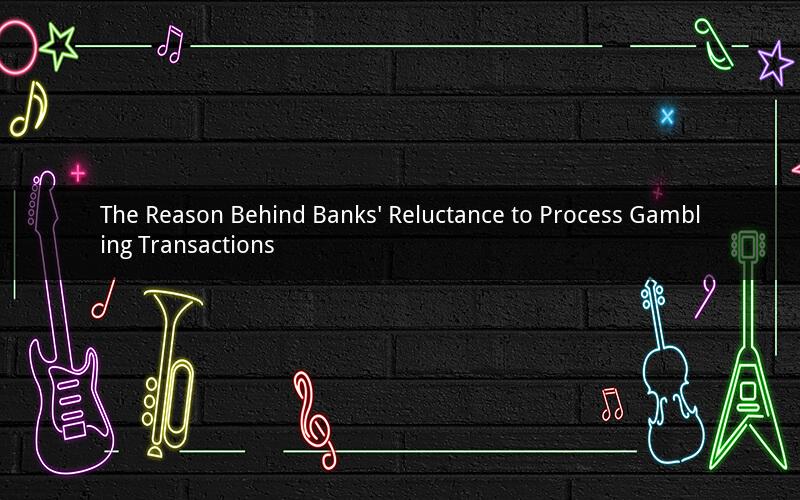
Banks have long been a cornerstone of the financial world, providing a wide array of services to individuals and businesses alike. However, when it comes to gambling transactions, banks often exhibit a reluctance to process them. This article delves into the reasons behind this hesitation, exploring the various factors that influence banks' stance on gambling transactions.
1. Legal and Compliance Concerns
One of the primary reasons banks are cautious when it comes to processing gambling transactions is the legal and compliance issues involved. Gambling laws vary from country to country, and in many jurisdictions, it is illegal to engage in or facilitate gambling activities. Banks are required to comply with these laws and regulations, and processing gambling transactions could potentially expose them to legal risks.
Moreover, banks must adhere to anti-money laundering (AML) and know your customer (KYC) requirements. These regulations are designed to prevent financial institutions from being used as a conduit for illegal activities, including money laundering and financing of terrorism. Since gambling activities are often associated with these risks, banks are wary of processing transactions related to gambling.
2. Reputation and Brand Risk
Another reason banks may be hesitant to process gambling transactions is the potential damage to their reputation and brand. The gambling industry has historically been associated with negative connotations, such as addiction, crime, and corruption. By processing transactions related to gambling, banks risk being perceived as endorsing these activities, which could tarnish their image and credibility.
Furthermore, banks are acutely aware of the public's perception of their role in society. They strive to maintain a positive reputation and be seen as responsible corporate citizens. Engaging in gambling transactions could be seen as a deviation from this ethos, leading to a loss of trust and confidence among their customers and stakeholders.
3. Operational and Security Risks
Processing gambling transactions also poses operational and security risks for banks. The nature of gambling involves high-risk activities, such as large deposits and withdrawals, which can strain the bank's systems and resources. Banks must ensure their infrastructure can handle the increased transaction volume without compromising the customer experience or exposing the institution to fraud.
Additionally, the gambling industry is not immune to cyber threats. Hackers may target banks processing gambling transactions, seeking to gain unauthorized access to customer accounts or steal sensitive information. Banks must invest in robust cybersecurity measures to protect themselves and their customers from these risks.
4. Regulatory Scrutiny
Regulatory bodies closely monitor financial institutions, including banks, to ensure they comply with relevant laws and regulations. When it comes to gambling transactions, banks may face increased scrutiny from regulators. This can lead to additional costs, such as audits, fines, and other compliance measures, which may deter banks from processing gambling transactions.
5. Customer Risk Profile
Lastly, banks consider the risk profile of their customers when deciding whether to process gambling transactions. Customers who engage in gambling activities may be perceived as higher risk due to the potential for financial instability and addiction. Banks may choose to avoid associating themselves with these customers to mitigate their own risk exposure.
In conclusion, the reluctance of banks to process gambling transactions can be attributed to a variety of factors, including legal and compliance concerns, reputation and brand risk, operational and security risks, regulatory scrutiny, and customer risk profile. While these reasons may seem compelling, it is essential to recognize that the financial industry continues to evolve, and banks may adapt their policies and procedures to better serve their customers and comply with changing regulations.
Questions and Answers:
1. Why do banks face legal and compliance concerns when processing gambling transactions?
Answer: Banks face legal and compliance concerns because gambling laws vary by country, and processing transactions related to gambling could expose them to legal risks, such as violating anti-money laundering and know your customer regulations.
2. How can processing gambling transactions harm a bank's reputation?
Answer: Processing gambling transactions can harm a bank's reputation by associating the institution with negative connotations such as addiction, crime, and corruption, which could lead to a loss of trust and confidence among customers and stakeholders.
3. What operational and security risks are associated with processing gambling transactions?
Answer: Processing gambling transactions may strain a bank's systems and resources, increase the risk of fraud, and expose the institution to cyber threats, necessitating the investment in robust cybersecurity measures.
4. How does regulatory scrutiny affect banks' decision to process gambling transactions?
Answer: Regulatory scrutiny can lead to additional costs, such as audits and fines, which may deter banks from processing gambling transactions due to the potential financial and reputational risks involved.
5. Why do banks consider customers who engage in gambling activities as higher risk?
Answer: Banks consider customers who engage in gambling activities as higher risk due to the potential for financial instability, addiction, and the increased likelihood of fraudulent activities, which could lead to a higher risk exposure for the bank.